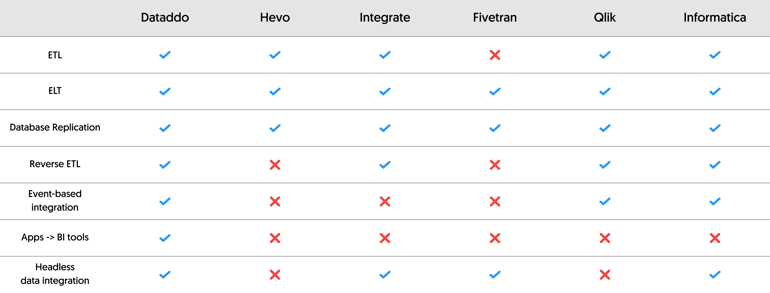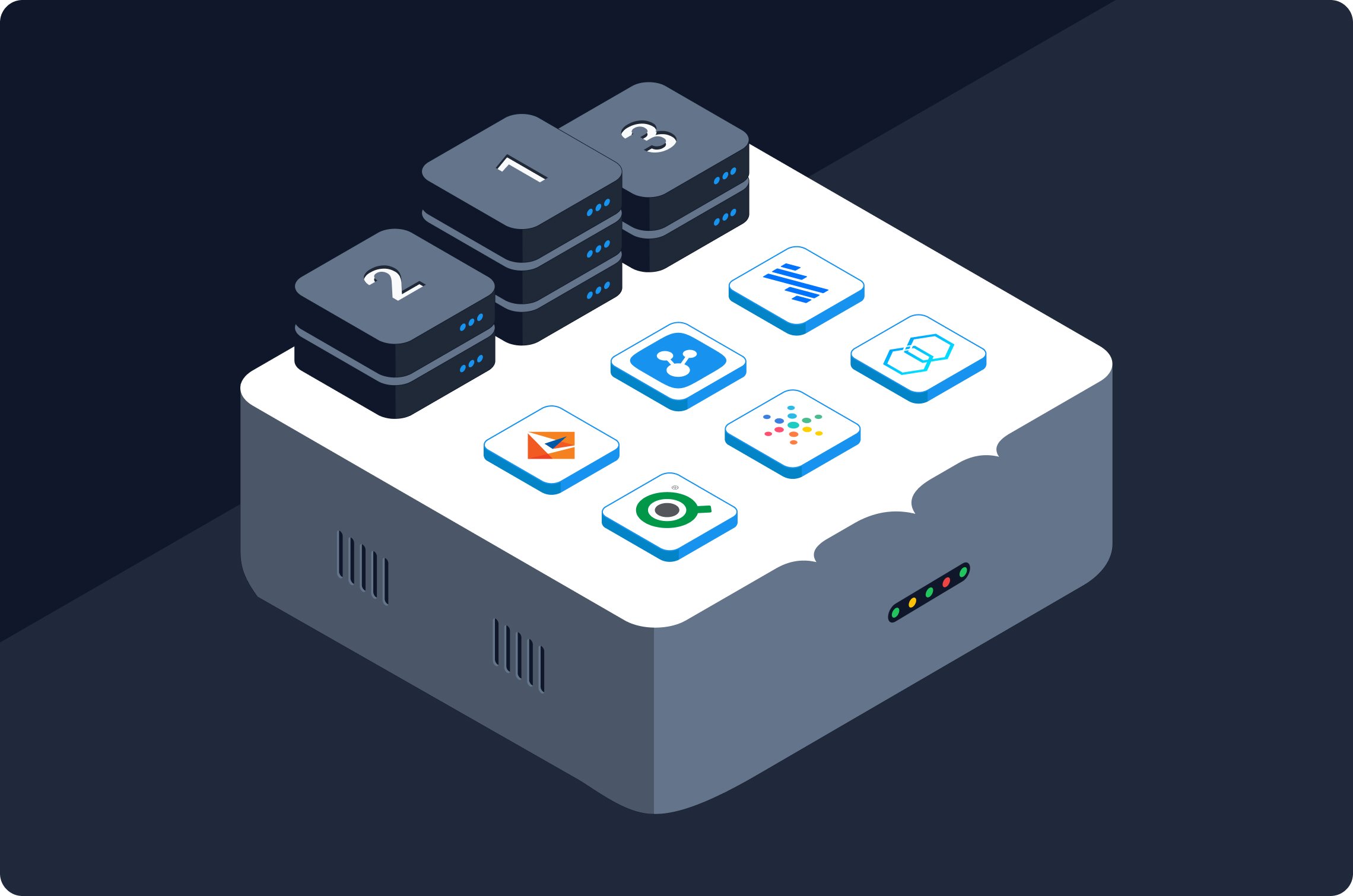With multi-cloud and hybrid-cloud strategies on the rise, more data coming from apps, and the tightening of data security measures globally, database replication is becoming a core supplement to classic ETL operations.
Maybe you already have a dedicated ETL solution in place, and you're looking for a dedicated replication solution to handle specific challenges like real-time data synchronization and improved disaster recovery? Or maybe you're looking for a multi-tool capable of handling all your ETL, replication, and other data integration needs?
In either case, this article will help you narrow down your choices.
Before we list our favorite database replication tools, we'll talk about what you should look for when selecting database replication software that will be relevant to your use case in 2025 and beyond.
Or, simply click to skip down to the tools.
What to Look for When Choosing a Database Replication Tool
In general, a future-proof database replication tool should:
- Be technology agnostic, i.e., able to connect any two databases.
- Offer flexible modes of replication (batch and CDC) and near-real-time sync frequency.
- Be able to quickly detect and resolve errors (for minimal downtime).
- Provide a centralized overview for governing all integrations.
- Offer inbuild data quality and logging solutions (for consistency).
- Be highly customizable.
- Be fully scalable.
- Be transparently priced.
- Be SOC 2 Type II certified, among other security criteria for data tools.
- Bonus: Have a user-friendly interface.
- Bonus: Support integration types aside from replication.
Let's unpack some of these criteria by asking the following questions.
Click the arrows to show details.
Do You (or Will You) Need to Replicate Data Across Database Technologies?
If you don't need to replicate data across different database technologies, it's likely that you one day will—especially if you plan on migrating to or across clouds, or from a production database to a data warehouse for analytics.
Make sure, therefore, that any database replication tool you choose is capable of connecting any two database technologies. If not, make sure cross-connectivity is at least in the roadmap.
How Customizable/Flexible Is the Data Integration Solution?
Out-of-the-box solutions are absolutely essential for any organization that doesn't want to accept the Sisyphean task of building and maintaining its own data integration solutions. But, let's face it—data-mature organizations are going to want stuff customized. How willing is the vendor's support team to work with you to implement custom transformations or accommodate unique formats? Read some online reviews or, better yet, sign up for a free trial and talk to support directly.
Also, does the replication tool allow you to mix and match replication methods? Any tool worth its salt should enable you to make full replicas, as well as copy only recent changes via various methods of real-time change data capture (CDC). Being able to flexibly mix methods will save a lot of processing time (and money).
What other Data Integration Types Do You Need Now and in the Future?
The market is currently filled with specialized integration tools for every use case—event-based messaging tools, ETL and ELT tools, database replication tools, and reverse ETL tools.
Traditionally, having these specialized tools for different use cases has made sense, and, depending on your organization, it may still make sense.
In general, to ensure that you don't have to keep adopting more specialized tools in the future that support new integration types, it makes the most sense to have a single, any-to-any data integration tool that supports all key integration types.
As data and analytics become a bigger and bigger part of everyday work, it will become less and less practical to have several niche tools for different workflows.
For example, when data teams want to integrate data from multiple eshops in a production database, they won't want to use one tool for ETL, another to replicate data to a warehouse for analytics, and another to send data back into CRMs via reverse ETL. It will be much easier if they can just use a single tool to manage all integrations, regardless of where they sit in a data infrastructure.
How Willing Is the Vendor to Develop New Connectors and How Fast?
Future-proofing is not just about enabling multiple replication methods and integration types; it's also about willingness to develop new connectors quickly. Indeed, a service may have all the connectors you need today, but what if you start using services they don't support?
Will you have to build and maintain new connectors yourself? Will they build it for you, but in six months? You want a vendor who is willing to build what you need, when you need it.
What Kind of Monitoring and Logging Does the Tool Provide?
All data replication tools (and, in fact, all data tools within an infrastructure) should have their own local monitoring and logging systems. The more detailed the monitoring and logging, the easier it will be to troubleshoot errors and detect issues as they occur. Some data replication tools only store log data for a couple of days, while others store it for several months. Find out before you buy.
*Naturally, if you are moving data across a range of tools, it would also be well to have some kind of data lineage tool on top of all of them to help you understand how data is extracted, transformed, and used from end to end.
What Data Quality Solutions and Observability Mechanisms Does the Tool Offer?
Data quality is a consistent roadblock to the success of data initiatives, especially AI initiatives. And it will only become a bigger problem as we continue to collect more and more data.
Data integration tools can do much to reduce data quality challenges by solving essential quality problems right at the extraction level.
Format harmonization, anomaly detection, rule-based filtering—these are some of the data quality features that will save processing in downstream systems.
Observability goes hand in hand with data quality because it helps streamline problem-solving processes and, in general, makes managing data easier. In addition to robust notifications and logging, make sure you choose a data integration tool that lets you manage all data connections via a central view.
Top Database Replication Software for 2025 and Beyond
Every software here provides multiple integration types, and all specialize in at least data replication and ETL (and/or ELT).
Here is a bird's-eye view of which tools offer which integration types.

Now, let's zoom into the details.
1. Dataddo
Dataddo is a fully managed, no-code data integration platform that connects cloud-based applications, BI tools, data warehouses, and data lakes. The platform offers ETL/ELT, reverse ETL, and data replication functionality, as well as an extensive portfolio of connectors, and a full suite of embedded data quality mechanisms.
Key features:
- Pricing: Fixed (pipeline/flow-based).
- Supported integration types:
- ETL/ELT
- Database replication (full replicas, various methods of CDC)
- Reverse ETL
- Event-based integration (app -> app)
- Apps -> BI tools (end-to-end)
- Headless data integration
- Data quality features: Transformations, rule-based filter, monitoring, detailed logs (thanks to Dataddo connector).
- Encryption: In-transit and at-rest.
- Time to add new connectors: 10 business days.
- Security: SOC 2 Type II certified, ISO 27001 compliant.
See Dataddo's database replication use case page for more information.
2. Hevo
Hevo is a cloud data integration platform specializing in ETL to a select number of popular data warehouses. Additionally, it provides capabilities for database replication and supports reverse ETL to Salesforce and HubSpot CRMs only.
Key features:
- Pricing: Variable (event-based).
- Supported integration types:
- ETL/ELT
- Database replication (full replicas, log-based CDC)
- Data quality features: Transformations, monitoring. Logs via Amazon CloudWatch Logs.
- Encryption: In-transit and at-rest.
- Time to add new connectors: Unknown.
- Security: SOC 2 Type II certified, ISO 27001 compliant.
For additional info, see a detailed comparison of Hevo and Dataddo.
3. Integrate
Integrate is tailored for ecommerce companies, and therefore features a no-code interface, but also offers powerful tools for data specialists. It supports various data integration types, including database replication and ETL/ELT.
Key features:
- Pricing: Fixed (based on tiers & connectors used).
- Supported integration types:
- ETL/ELT
- Reverse ETL
- Database replication (full replicas, log-based CDC)
- Headless data integration
- Data quality features: Transformations
- Encryption: In-transit and at-rest (premium feature).
- Time to add new connectors: Unknown.
- Security: SOC 2 Type II certified, ISO 27001 compliant.
4. Fivetran
Fivetran is a cloud-based integration solution with a key distinction from the solutions above—it focuses only on ELT and data replication (no ETL). This makes it suitable for companies that need to get all their data to a warehouse fast, and that have the engineering resources to clean it once it gets there.
Key features:
- Pricing: Variable (row-based). Free plan available.
- Supported integration types:
- ELT
- Database replication (full replicas, various methods of CDC)
- Headless data integration
- Data quality features: Notifications, a "history" mode for analyzing how data has evolved, log data kept for 1 week.
- Encryption: In-transit and at-rest.
- Time to add new connectors: Must be coded by users.
- Security: SOC 2 Type II, ISO 27001 certified and/or compliant.
For additional info, see a detailed comparison of Fivetran and Dataddo.
5. Qlik
Qlik is actually best known as a developer of BI tools. But, through its various subsidiaries like Talend and Attunity, it offers a variety of data integration and data quality products. Its data replication solution, Qlik Replicate (formerly Attunity), specializes in CDC and real-time streaming.
Key features:
- Pricing: Contact sales.
- Together with its network of subsidiaries, Qlik supports the following integration types:
- ETL/ELT (via Stitch Data)
- Database replication (full replicas, various methods of CDC)
- Reverse ETL
- Event-based integration (app -> app)
- Data quality features: Qlik offers a range of data quality products by Talend.
- Encryption: In-transit and at-rest.
- Time to add new connectors: Unclear.
- Security: SOC 2 Type II, ISO 27001 certified and/or compliant.
6. Informatica
Informatica's Intelligent Data Management Cloud is an end-to-end enterprise data integration solution that supports a diverse range of data integration use cases. It can do just about anything, but it is complex, expensive, and takes more time to deploy.
Key features:
- Pricing: Various models (consumption-based).
- Supported integration types:
- ETL/ELT
- Database replication (full replicas, various methods of CDC)
- Reverse ETL (app -> app)
- Event-based integration (app -> app)
- Headless data integration
- Data quaity features: Transformations, profiling, pre-built rules, notifications, logs.
- Encryption: In-transit and at-rest.
- Time to add new connectors: Informatica offers a DIY connector builder tool.
- Security: SOC 2 Type II, ISO 27001 certified and/or compliant.
Summing Up: Choosing a Database Replication Solution
As we said at the beginning of this article, it's extremely important to pick a data replication tool that can handle all integrations you need now or might need in the future.
This means it should scalable, both in terms of the volume of data it can transfer, and the willingness of the support team to build new connectors. A strong bonus would also be support for various integration types, so that you can use a single tool to move data from end to end.
You'll also want it to have inbuilt data quality tools and a robust logging system to help diagnose and eliminate as many problems as possible at the data extraction level.
Security is a top priority, too. But, as far as the tools on this list are concerned, that shouldn't be a concern 😊
|
Connect All Your Data with Dataddo One tool for all your data integrations, now and in the future. |




Comments